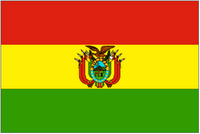Nationalization and Bolivia
 Following in the stead of Venezuela, Bolivian President Evo Morales decreed on Monday that the Bolivian government will assert control over the domestic natural gas industry. Foreign energy companies are scrambling to figure out what to do next, and several foreign governments have responded negatively to the President's decision.
Following in the stead of Venezuela, Bolivian President Evo Morales decreed on Monday that the Bolivian government will assert control over the domestic natural gas industry. Foreign energy companies are scrambling to figure out what to do next, and several foreign governments have responded negatively to the President's decision.From the BBC:
Under the May Day decree, private energy companies will have to sell a controlling stake to the Bolivian government and renegotiate contracts.
At the largest gas fields, royalty payments will increase from 50% to 82%.
A thirty-two percent royalty hike could give entire corporate boards heart attacks, not to mention the requirement to divest a fifty-one percent share of company stock to the Bolivian government. The energy companies invested in Bolivia have little choice in the matter, seeing as Bolivia has retained the option of simply nationalizing everything and expelling the foreign companies altogether. The Bolivian government has certainly started negotiations by placing the metaphorical shotgun on the table.
Speaking of the evil foreign energy companies:
But the private gas companies, which have invested about $3.5bn in gas exploration and development since 1997, say it is a worrying development.
A spokesman for Petrobras, one of the largest foreign investors in Bolivia, called it an "unfriendly" action.
Spain's Repsol YPF is also a big player in Bolivia, and the Spanish government expressed "deep concern" at the move.
The US Exxon Mobil Corporation said it was "closely monitoring" the situation.
Other major international corporations operating in Bolivia include the British companies British Gas and British Petroleum and France's Total.
I'm sure the foreign companies are all just dancing for joy at this announcement, not to mention that foreign governments that have a vested interest in the affected companies. While nationalizing the gas industry might have won stirred nationalistic emotions in his supporters, President Morales has most definitely cooled relations with several nations, not to mention likely harming foreign investment in the process. The energy companies, who are potentially on the hook for a total loss of equipment and commidity rights, are now coming to terms with the understanding that the Bolivian government can't be trusted to stick to a contract.
Bolivia, meanwhile, is gearing up to take control of several aspects of the supply chain:
Companies have six months to negotiate new contracts with the Bolivian government. During that time, the Bolivian government says it will carry out audits of each company to determine how much it should pay for a stake of at least 51% in each.
Bolivia's state-owned energy company, YPBF, will take control of the production, transport, refinery, and sale of the gas.
And as to the specifics of the royalty increases:
With immediate effect, gas fields producing more than a daily 100 million cubic feet of gas will retain only 18% of the gas they produce, down from 50%. This is reported to apply to two fields, San Alberto and San Antonio.
Companies operating other fields will retain 40%, local media report.
Nice to see that the Bolivians are feeling generous.
Even though the President's decree gave a time period of six months for the foreign companies to negotiate new contracts with the government, troops and domestic engineers are already on the move:
About 100 soldiers peacefully took control of the Palmasola refinery in the south-eastern city of Santa Cruz, reported the news agency Associated press.
The government said soldiers and engineers were sent to 56 locations around the country.
Now that's negotiating in good faith!
Following up on Monday's display of national pride, the Bolivian government today made public intentions to extend government control to several other industries, with the mining and timber industries the main targets.
On Tuesday, Vice President Alvaro Garcia Linera said mining companies could face higher taxes and royalty payments and that the government will intensify enforcement of existing laws to break up big underdeveloped land holdings, apparently to turn them over to the poor.While I can understand cracking down on companies that receive land rights and fail to live up to their development requirements, increasing tariffs and royalty payments on raw goods will probably only hurt Bolivia's export income. The combined weight of high taxes and high royalty payments could very well be the breaking point for raw minerals consumers, who could quite conceiveably look elsewhere for raw goods.
The government also will crack down on foreign timber companies violating conservation laws, Garcia said, and would steer companies to export finished wood products rather than raw timber.
Again, I can understand tightening the screws on companies that ignore conservation laws, but attempting to force a change from raw wood goods to finished wood products might not be easy, much less make economic sense. Bolivia's entry in the World Fact Book fails to mention any domestic furniture industry (harvesting of raw goods, preparation of foods and handicrafts are apparently the main industries beyond agriculture), so a substantial investment in equipment, factories and training would be needed. Given Bolivia's current penchant for nationalization, high tariffs and popular anti-capitalistic fervor, how many companies would be willing to take a chance on investing large sums into the Bolivian economy?
President Morales listened to the will of the people, nationalizing one industry and threatening several others, but will his decisions yield tangible results for the common citizen or will the rest of the world eschew the Bolivian economy? I hope Bolivia can live with the consequences of those actions, both good and bad.
Technorati Tags:
Bolivia, Nationalization, Evo Morales


0 Comments:
Post a Comment
<< Home